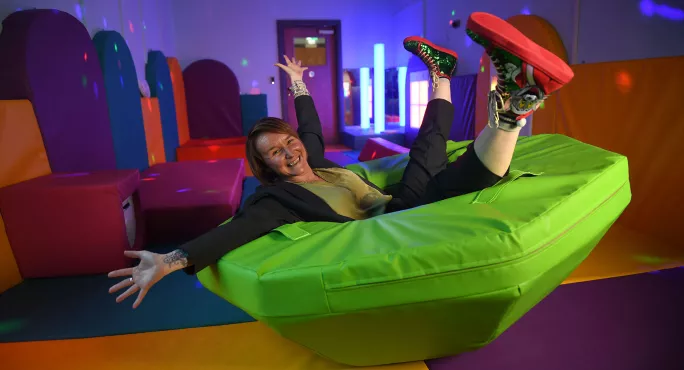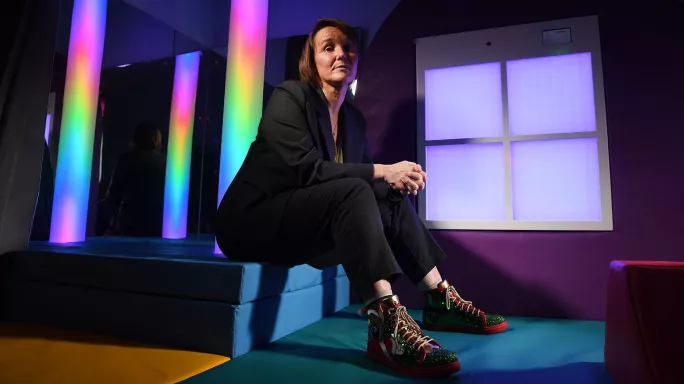- Home
- Leadership
- Strategy
- 10 questions with...Dr Nic Crossley
10 questions with...Dr Nic Crossley

Dr Nic Crossley is the CEO of Liberty Academy Trust, a three-school multi-academy trust (MAT) that focuses on supporting autistic pupils, which she has led since it was opened in late 2022.
In addition, Dr Crossley is a council member for the Association of School and College Leaders (ASCL) and chair of its Women Leaders’ Network. She is also a member of the Whole School SEND Steering Group, co-founder of the MAT SEND Leaders Group and co-author of Inclusion: A Principled Guide for School Leaders.
For our 10 questions series, she recalls her own time in school, how she came to be involved in special educational needs and disabilities (SEND) education, why there is a long way to go to improve the holistic education experience for pupils with SEND and why overturning an Ofsted judgment was a career high.
1. Who was your most memorable teacher?
My best teacher was Mrs Morton. She was a history teacher in my secondary school and she was so passionate and so engaging.
She was my Year 9 teacher and we were looking at the French Revolution, which is an exciting topic to study anyway, but she just brought it to life.
It made me take history at GCSE and A level.
That was at a school in Trafford, just within the Greater Manchester boundaries.
So if you are reading this, Mrs Morton, thank you for everything that you gave me, and my love of history.
2. What were the best and worst things about your school days?
I was a bit of a loner and a bookworm so mixing was always difficult.
But where I excelled was in sport, as a runner. Athletics was everything to me and I was able to “talk” through my sport - I didn’t have to be the life and soul of the party as athletics is an individual sport so the buck stops with me, and I enjoyed that the most because I was able to thrive.
In some ways, though, my difficulties at school came from sport too because people thought I was arrogant with it.
I wasn’t. It was just that the performances spoke for me and people thought I was being cocky because I kept on winning.
3. Why do you work in education?
I came into teaching because I had a passion for English literature. And I wanted to share that passion, like Robin Williams in Dead Poets Society.
I actually started after school in the housing sector but then a few years later I decided I wanted to do something more, in a job where I could be passionate about something I really loved.
So I went to university and did English literature and philosophy, and then took a graduate route to qualified teacher status and got a job in a mainstream school after that.
A few years later I was working for a local authority and in that role, I was a consultant to a special school - Stephenson Academy, which was the first academy special school in the country - and they had a deputy head role advertised. I went for that and got it.
I knew nothing about special education and it was really hard at first - I spent a lot of nights in tears wondering what I was doing wrong because it was so different - but I’ve been in the sector now for 11 years and I love it. It’s so important.

4. What are you proudest of in your career?
It’s something that is quite recent actually. One of our schools had a tricky Ofsted inspection last year and was looking at being graded as “requires improvement”, which, as our first school in a new trust when I’m the CEO, was not the outcome we were expecting.
I did not think the school was “requires improvement” at all.
But that inspection questioned everything I know about education and made me think I was wrong, that I hadn’t got a clue and didn’t know anything about SEND.
But I appealed against the judgment and put in copious amounts of evidence based on the inspection handbook, framework, their conduct and so on, and when they came back for another inspection it was upgraded to “good”.
So that is what I’m proud of because that doesn’t happen often and it validated that we do know what we’re talking about and know what good practice looks like.
5. Who would be your colleagues in your perfect staffroom?
The characteristics for me are people who are passionate, who are reflective and who are willing to learn.
For me, if you’ve got those characteristics, you can be supported to be the best teacher, the best leader in the world.
If you are not passionate or ready to learn, you’re not going to make a difference.
6. What are the best and worst aspects of our school system?
What’s good is you’ve got thousands of professionals who want the best for children and want to make a difference, and they’ve got, collectively as a sector, a huge body of knowledge and are stronger together.
Where I struggle…the SEND system is broken, and I think one of the contributing factors to that is we work in isolation all the time. We talk about collaboration, we talk about professional dialogue, but quite often it’s lip service.
The solutions are out there but we have too much politics that stops them from happening, or you start to see some changes happening for good and then there’s a change of government and it becomes disjointed again.
There needs to be better consistency and a more targeted approach to solving the issues with the system because the issues we’re dealing with now are 40 or 50 years old.

7. Who in education has influenced you the most?
I think she knows this but it’s one of my former headteachers, Wendy Tomes. She was so energetic, and so “everything has to be done yesterday”. She influenced me in terms of that urgency that things have to be done quickly because the children are with us for such a short period of time.
You can’t be deliberating and deciding to do a big collaborative thing, and think about whether you’re going to make changes next year, because the child has already missed a year of their learning.
8. If you became education secretary tomorrow, what would you do?
Well, I’ll probably get in the revolving door because there’s another one coming along!
I think, though, that I would focus on SEND. It is difficult and I do understand that for the education secretaries we’ve had, special educational needs is such a huge thing to understand. How do you even start?
But my focus would be around making it a priority, not an add-on, and I’d be wanting to work towards cross-party consensus, so it is always a key focus and not shifting. There’s lots of expertise out there. Ministers need to come together to understand what is a good education for someone with SEND, and then stick to it.
9. Who has made the biggest difference to education in the past 12 months?
The person that comes to mind, for me, is Geoff Barton.
That could be me being swayed by the fact that I am a council member for the ASCL, but I think the work he’s done in the past year around discussions on teachers’ pay and conditions, and the measured way in which he talks to people, working across parties - I think he has been pivotal on that.
10. What are the most important lessons you’ve learned doing this job?
Definitely resilience! And the need to carve out time for yourself and make sure you prioritise that time and don’t feel guilty about it. That’s something I really struggle with - I feel like I should be working all the time.
Also, not to take things personally. Every day is a new day, you can’t hold grudges. And that’s even more important when you’re working with children, particularly those coming from a complex background.
You have to give them a fresh start every day.
Dr Nic Crossley was talking to Dan Worth
You need a Tes subscription to read this article
Subscribe now to read this article and get other subscriber-only content:
- Unlimited access to all Tes magazine content
- Exclusive subscriber-only stories
- Award-winning email newsletters
Already a subscriber? Log in
You need a subscription to read this article
Subscribe now to read this article and get other subscriber-only content, including:
- Unlimited access to all Tes magazine content
- Exclusive subscriber-only stories
- Award-winning email newsletters



